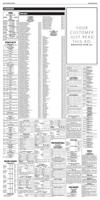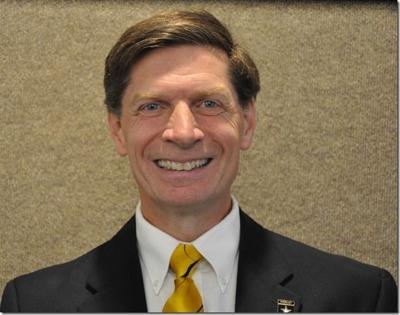Cirrhosis of the giver was discovered in A.D. 34 by Ananias and Sapphira (Acts 5:1-11).
It is an acute condition that renders a patient’s hands immobile when called on to move in the direction of his wallet and then toward the offering plate. This strange malady is clinically unobservable in such surroundings as the golf club, supermarket, clothing store and restaurant. This affliction is actually a symptom of a more basic need of the soul.
Winston Churchill once said, “You make a living by what you get …you make a life by what you give.”
When you want to make the most of your God-given life, I recommend giving your life back to God. One of the most difficult ways to do that is to give your money away. Christians call that stewardship, the faithful use of the money God gives us in life to serve and glorify God.
This is not an easy thing to do, because there are so many unholy trinitarian idols. Some examples of this are pleasure, possessions and position. Who among us hasn’t spent some time worshipping sex, shekels and the stomach, or at least two of the three? Another enslaving trio is football, the firm and the family. Any of these can be blessings in our life, but when we worship them, they become idols, and God hates idols. The last trinity of idols God knows is our greatest temptation is money, money, money.
So God, who gives us all we have, has asked for us to give back a tithe, that is 10% of what he has given us, to help us keep money from being an idol. That means we get to keep 90%.
We read in Malachi 3:10, “ ‘Bring the whole tithe into the storehouse, that there may be food in my house. Test me in this,’ says the LORD Almighty, ‘and see if I will not throw open the floodgates of heaven and pour out so much blessing that you will not have room enough for it.’ ”
Some will try to argue tithing is an Old Testament teaching, but Jesus doesn’t teach tithing. This is true, but Jesus didn’t teach against tithing either. Instead, he told the rich ruler to give away everything (as is detailed in Luke 18:18-27) and praised the poor widow for giving all she had to give (Mark 12:41-44). I think Jesus’ expectations of giving are far higher.
In his book “Halftime,” Bob Buford tells a story of a time in his life when he was at a crossroads. At the age of 44 he experienced what he called success panic. Basically, he had accomplished all his business and financial goals in life, had bought all the toys he wanted to buy, and he didn’t know what to do with the second half of his life. He sought out the council of a man he trusted. He shared his life with the man, including his values, hopes and dreams for his family and marriage, and his faith in Jesus Christ. He had a strong sense that, in all of the success, he was missing something important and wanted his friend to help him find out what it was.
The friend asked a simple question, “What is in the box?” Bob was puzzled by the question. His friend added, “I have listened to you for a couple of hours trying to figure out what is in your box. It’s either money or Jesus Christ. If you can tell me which one it is, I can tell you the strategic planning implications of that choice. If you can’t tell me, you’re going to bounce between those two values and be confused.”
He had always thought that he was a strong believer, but at that moment, he realized that he had not lived that way. Up to that point, money had been in his box. I am sure Jesus’ words from Matthew 6:24 came into his mind, “No one can serve two masters. Either he will hate the one and love the other, or he will be devoted to the one and despise the other. You cannot serve both God and money.”
He made a decision that day that only Jesus Christ would be in the box, and it changed everything. He no longer felt he was missing out on the point of life.
What is in your box? Take time to reflect on this. Otherwise, you will bounce around between differing values, confused about life. If it is Jesus Christ, how does the way you live and the way you give show the truth of the claim? If it is something else, what does that mean for where you are going in life?
















